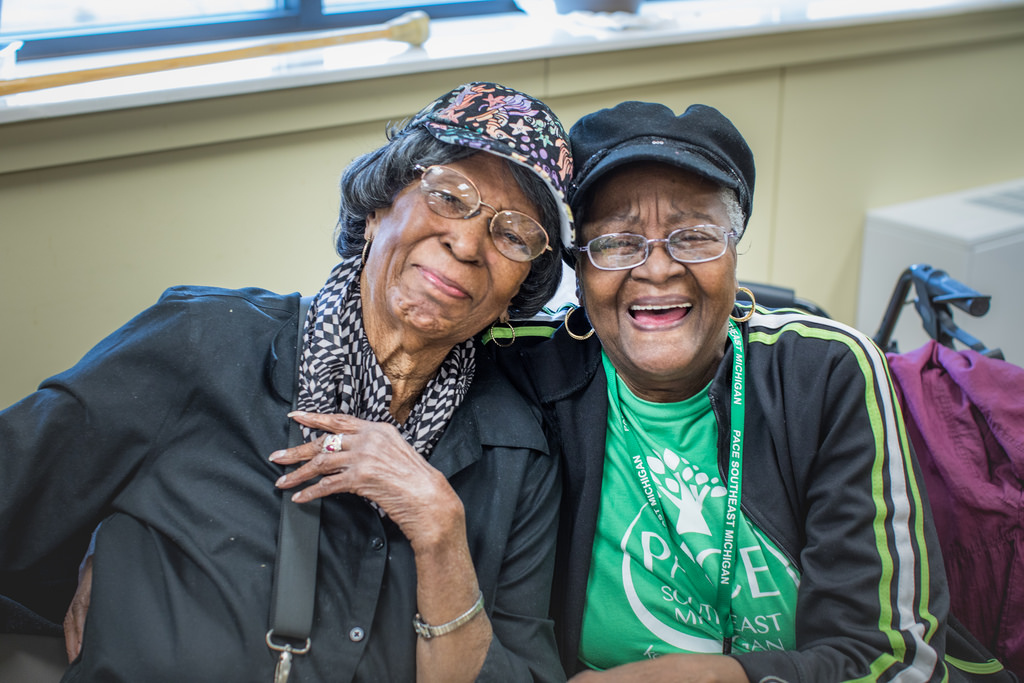
Michigan is home to more than 1.7 million caregivers. These unpaid friends, family members, and neighbors are critical to the wellbeing of older adults—and often, caregivers are older adults. Caregiving is a complex responsibility that requires tremendous effort, and more than half of caregivers in our state report a need for greater support and resources. It is important we continue listening to their voices as we look to enhance services around them.
That’s why our Healthy Aging program is committed to supporting caregivers with expanded resources as well as better access to those resources. One promising example taking shape in Southeast Michigan: the Caregiving Coalition. Read on to learn how this project is bringing funders together around an innovative solution that centers the needs and voices of caregivers.
BUILDING A COALITION OF CAREGIVERS
Over the past several years, the Southeast Michigan Senior Regional Collaborative (SRC)—a 35-member group of agencies that serve older adults in Macomb, Oakland, and Wayne Counties—has been leading the formation of a caregiving coalition made up of caregivers from throughout the region.
Building on a planning process supported by Center for Health Care Strategies (CHCS)—and with training and technical assistance from Community Catalyst—the coalition launched in March 2023 to elevate the voices and concerns of caregivers in discussions around policies and programs that influence their experience.
“This is a big deal,” said Health Fund Senior Program Officer Tim Niyonsenga, who leads the Healthy Aging team’s caregiving strategy. “We’ve had coalitions around aging and dementia in the past, but nothing with this dedicated focus on caregiving. It took multiple funders and lots of generous input and effort from actual family caregivers to shape the whole thing.”
In its initial stages, early discussions have centered on topics like respite, support and services, education, mental health, advocacy, and funding. As these priorities continue to take shape, subcommittees will take ownership for moving them forward.
Over time, the coalition will provide education to caregivers that focuses on their needs, increase access to supports and resources, provide tools to reduce the mental and physical load of caregiving, and highlight the impact of cultural diversity on caregiving.
REPRESENTATION FOR A DIVERSE COMMUNITY
Not all caregivers are alike. Social and cultural factors like race, nationality, income, and geography play a massive role in shaping the caregiving experience. To this end, SRC has placed major emphasis on recruiting caregivers from the Latinx, African American, and LGBTQIA+ communities, along with other diverse voices from around the region.
“Communities of color may address care differently, which may include keeping care within the family and not seeking outside help: like nursing home care. And even the idea of mental health could mean something much different and be less accepting,” SRC Executive Director Kristie King said. “There are levels of identity and intersecting stresses that affect every person’s experience. We want to include as many voices as we can to make sure those perspectives are heard.”
SRC has actively sought to make it easier and more convenient for all caregivers to join the coalition and add their insights to the discussions. This includes steps like scheduling meetings at multiple times and conducting all sessions virtually for convenience.
Meanwhile, SRC has hired a community health worker to work with coalition members from all areas of the community to ensure that their participation in the coalition is an effective and positive experience.
MULTI-FUNDER PARTNERSHIP
The coalition is the Michigan extension of a 10-state project funded by Grantmakers in Aging. This broader effort, known as Changing the Care Conversation, promotes innovative and responsive approaches to supporting caregivers, while amplifying their voices to the forefront of the discussion.
Participation in this national program, together with grant support from the Health Fund, the Ralph C. Wilson Jr. Foundation, Community Foundation for Southeast Michigan, and others has provided technical assistance to train SRC staff, engage caregiving champions, and build the framework for the coalition’s long-term future.
“In a few years, this group is going to have its own identity,” said King. “Now that we’ve launched, we’re working with our caregiving champions to continue getting their buy-in, doing visioning and goal setting. At the end of the day, it’s their voice that matters most.”
The Caregiver Coalition represents an exciting model to drive potential progress for a group in need of more support. A collaborative approach, inclusive processes, responsiveness to community voices, and plans for sustainability are key elements aligning the coalition’s work with our Healthy Aging program strategy, making the project one we’re excited to support together with our grantmaking partners.
JOIN THE CAREGIVING DISCUSSION
To learn more, join us on May 15 for a webinar with Caring Across Generations, who are SRC members and partners in advancing caregiver voices. Caring Across Generations also are collaborating with the Health Fund to assist our grantees in building effective caregiving supports.
The webinar will provide background on federal-level and state-level care infrastructure, opportunities across aging and disability, paid leave, and childcare. The discussions also will uplift findings from the RAISE Family Caregivers Act and discuss how we can collaborate on care issues at the state-level in Michigan.
